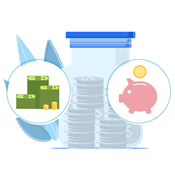How to Maximize Savings
Saving is a crucial piece of your financial health. Keep reading to learn 12 of the most effective strategies for maximizing your savings.
 |
- Track Your Spending
- Build a Budget
- Make Sure You Aren't Overpaying
- Hack Your House
- Sell Your Car
- Learn To Cook
- Cut Your Cable
- Build A Side Hustle
Maximize Savings: Banking & Investments
It's no secret that everything is incredibly expensive these days. And while earning more money is helpful, you can't neglect your savings.
So, what are the best, most effective ways to save more money?
In this guide, discover 12 tried-and-tested ways to maximize your savings and get the most out of your money.
Maximize Savings: Optimize Your Lifestyle
 |
Increasing your savings doesn't have to be complicated.
You won't need to hire a fancy financial advisor or start tracking the stock market daily.
Most people can increase their savings by simply looking at their lifestyle and making a few tweaks.
Read on to learn several actions you can take today to maximize your savings.
Further down, you can learn how to put that extra money to work with the right bank accounts and investments.
1. Track Your Spending
To save as much as possible, you'll need to know where your money is going. That means tracking your spending with something like an online budgeting tool or money management app.
A good spending tracker will let you:
- See how much you spend on major categories like:
- Food
- Entertainment and leisure activities
- Housing
- Utilities
You may be surprised by how much simply knowing where your money is going helps you spend more consciously.
- Food
- Set goals for major milestones like debt payoff and savings.
- Create reminders for bills and payments, so you don't miss anything.
Most money management apps today can help you keep track of your spending with minimal effort on your part. And once you've set them up, it's pretty much just wait and watch the data flow in.
2. Build a Budget
Sometimes progress means drawing hard lines in the sand. That means building a budget.
If you know how much you can afford to spend on each category of your budget, there's less risky guesswork that can threaten your finances.
You'll know, in the moment, without a shadow of doubt, whether you can afford that new pair of shoes or that curvy monitor for your PC.
Try using a calculator to create your own, customized budget:
- General budget calculator
- 50-30-20 budget calculator
- Student budget calculator
3. Make Sure You Aren't Overpaying
It seems like everything is a subscription these days—movies, tv, music, podcasts, newsletters, articles, and beyond.
And they regularly increase in price, too. First, it's $11 a month. Then, it's $13. Then, $15. Maybe you even tack on Disney Plus, Hulu, and Paramount Plus.
How much of your paycheck is being siphoned out of your wallet without you even noticing? And how much are you being overcharged?
Apps like Truebill and Trim can help you cut your bills, find the places you're overpaying, and save you a whole lot of time and money in the process.
4. House Hack & Cut Back Your Rent
Housing is probably your biggest expense, so if you can cut back here, you could save thousands of dollars over the years.
But we're not talking about moving back in with your parents.
"House hacking" is a recent trend, and with rent prices and mortgage rates increasing, it's easy to see why.
Here's how it works: You essentially try to generate income from your property. Traditionally this has meant buying a property with multiple units. You would live in one, and you'd rent out the rest.
But there are plenty of other ways to do this:
- Add a guest house to your property. This could be a cottage, tiny home, or even an RV.
- Rent out a spare room in your house on Airbnb.
- Rent out storage space in your home with Store At My House or Neighbor.
- Sell your house and join the #VanLife trend.
5. Sell Your Car & Save On Transportation
Are you noticing how expensive it's getting to own a car? The average cost of owning a car spiked to over $10,000 a year in 2022. [1]
With your monthly payments, the interest on your payments, maintenance, and gas prices, you could save a big chunk of change by finding another means of transportation.
There are plenty of apps offering alternative options, such as:
- Sharing a car with friends or strangers with apps like Zipcar.
- Carpooling with neighbors or using an app like Waze Carpool.
- Ridesharing apps like Uber and Lyft.
- Public transportation is easier now with apps like Moovit.
- Riding a scooter or bike with Lime.
If you could save a few thousand dollars a year and add it to your investments, this can really add up.
6. Learn To Cook & Save Money on Food
Food is most people's third-largest expense. Americans spend 10% of their total budget on food (5% at home, 5% away from home). [2]
Considering the higher prices of food, markups on alcohol, and 15% to 20% tips, you can save a lot of money by cooking most of your food at home.
If you are only ready to take a small step, try cooking protein-heavy meals at home like steaks and hamburgers. These foods have the largest price markups at restaurants.
Or you could try a meal delivery service like Home Chef.
If you want to embrace this lifestyle fully, you could learn to make plenty of foods from scratch.
7. Cut Your Cable & Save On Your Entertainment
When budget trimming, entertainment tends to be the first thing that gets cut. But if you save money on housing, transportation, and food, you'd only need to make minor cuts here.
However, if you have cable tv, you could find alternatives and save money.
Consumer Reports found that people have an average cable bill of $217 per month on cable tv, including an extra $450 per year in fees.
But streaming services like Netflix, Hulu, and Amazon Prime are each less than $15 per month.
If you cut your cable and choose three streaming services, you could save at least $2000 per year.
Or you could reduce your TV consumption and spend that extra time on a hobby that could increase your income.
8. Build A Side Hustle & Increase Your Income
You can only get so far by cutting your expenses. To maximize your savings, you'll want to add an extra income stream.
Currently, 29% of Americans have an alternative work arrangement. And it's never been easier to make money with a side hustle.
Depending on your interests, you have plenty of options:
- Freelancing with your current skills on job boards like Upwork
- Ridesharing like Uber and Lyft
- Delivering food for apps like Uber Eats
- Teaching English online with Cambly
- Dog walking with Rover and many more
You can start making big gains if you raise your income and keep your savings rate steady.
But what should you do with all that extra money? Read on to learn about the best banking and investments to boost your savings.
Maximize Your Savings: Banking and Investing
Once your lifestyle is optimized, and your savings starts to grow, it makes sense to put this money to work for you.
But which bank account is the best place to store your savings? Or should you put it all into investments? What are the risks?
Increasing your savings can be pretty simple if you follow some general principles.
1. Pay Off Debt
If there's one generation that knows about debt, it's ours. We're looking at you, student loans.
Paying off any debt, especially high-interest debt, is a huge priority. Otherwise, it can undermine all your savings efforts. Once you free yourself from debt, your savings efforts will go much further.
If you feel buried under student loans, here's a guide that might help. We've also looked at some of the best personal loans for debt consolidation, as another option.
And let's not forget credit cards. While some credit card debt is to be expected, too much can be a problem. Do your best not to live beyond your means, and pay off your credit cards before your billing cycle ends.
Your wallet will thank you.
2. Automate Your Savings
Now that you know how to address debt, budgeting, and spending, it's time to focus on helping your money grow.
Obviously, a pay raise would be nice. But in the meantime, you can start earning interest on your savings with a high-yield interest account, CDs, or interest-bearing checking accounts.
High-Yield Savings
For the best rates on interest accounts, you'll probably want to look to an online bank like Ally.
Interest rates at most banks are at historical lows. But since online banks spend less money on overhead, they can pass those savings on to you in the form of higher interest rates.
CDs
Certificates of Deposit are widely available and offer higher-than-average interest rates in exchange for fixed-term deposits. You'll likely get the best rates for 5-year CDs, but many people opt for a range of terms in a technique called laddering.
Allowing your CDs to expire at different times means you'll always be earning, but will also have ready access to your money. Some banks also offer no-penalty CDs, so you can withdraw your money if you need to.
Interest-Bearing Checking Accounts
While checking accounts typically don't offer the same interest rates as savings accounts do, there are some high-yield checking accounts out there.
This can be an effective solution for the money you use for day-to-day purchases and paying bills. Unlike a standard checking account, an interest-bearing checking account can help you maximize your returns.
Banks like Ally, Axos, or Nationwide all offer users the potential to earn interest on their checking.
3. Take Advantage of Contributions
Investing in a retirement account is one of the best places to start investing, and often your employer will help.
Many employers will offer to match your contributions to the company-offered 401(k). This is essentially free money, offered as a part of your company benefits.
Some companies will give as much as a 100% match. And they usually contribute up to a set rate of your annual salary, often between 3% and 5%.
While 5% might not seem like much, these contributions can grow exponentially over the years.
You can plug your numbers into a retirement calculator to see how your investments could grow over the next 5, 10, and 30 years.
4. Diversify Your Investment Portfolio
Investing can turn a modest nest egg into a big one.
The best way to invest depends on your goals and what sort of assets you're interested in. For beginners, apps like Robinhood for stocks or Coinbase for crypto can be an easy way to start investing in just a few minutes.
You should also consider an individual retirement account, or IRA, which can offer tax-advantaged savings and investing options.[4] IRAs are limited in what assets they carry, but if you know where to look, you can find one that works with gold, or crypto, or just about any other asset.
Bottom Line
Maximizing your savings is a multi-pronged approach. The first step is plugging any holes that are costing you money.
That means paying off high-interest debt as quickly as possible, making a budget, and keeping track of where you're spending your money. Just knowing can often make a difference in your behavior.
After that, grow your nest egg through investments, high-yield savings and checking accounts, and other interest-earning accounts. The savings game is a slow and steady one, but once you get started, you'll start seeing a real difference in your finances faster than you think.
References
- ^ United States Department of Transportation.Average Cost of Owning and Operating an Automobile, Retrieved 9/23/2022
- ^ USDA Economic Research Service: Food Prices and Spending.^ Board of Governors of the Federal Reserve System. Report on the Economic Well-Being of U.S. Households in 2020 - May 2021, Retrieved 4/16/2022
- ^ Internal Revenue Service. Individual Retirement Arrangements (IRAs), Retrieved 4/16/2022
- ^ FINRA. The Reality of Investment Risk, Retrieved 4/16/2022
Jeremy Harshman is a creative assistant at CreditDonkey, a bank comparison and reviews website. Write to Jeremy Harshman at jeremy.harshman@creditdonkey.com. Follow us on Twitter and Facebook for our latest posts.
Note: This website is made possible through financial relationships with some of the products and services mentioned on this site. We may receive compensation if you shop through links in our content. You do not have to use our links, but you help support CreditDonkey if you do.
|
|
|





